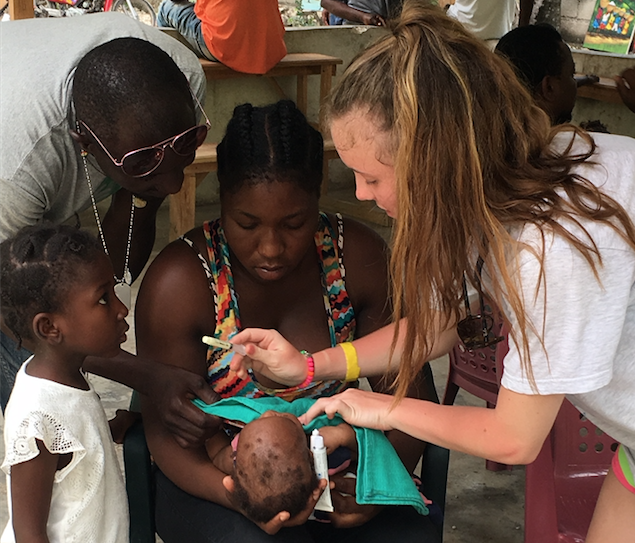Just over a month ago, I was jumping into the middle seat of a black Toyota SUV traveling up a mountain road that would be best described as a riverbed with no river. With my dad behind the wheel, I sat crammed in a car full of medical professionals and Haitian translators. We were traveling up a daunting 4,000-foot climb that would take us to a small Haitian mountain town by the name of Ivoire. It’s a 10-mile drive, but because of the road conditions, it took us over two hours to get to our destination.
I am a local 18-year-old Asheville High School senior and just returned from my second trip to Haiti with a local nonprofit called Consider Haiti. We were there to set up four pediatric clinics for Haitian children. My job was to give deworming medicine to all the children who came through our clinics.
This was my second trip traveling with Consider Haiti. I was prepared for the work in front of me, but you are never truly emotionally prepared for what you see in Haiti. Malnutrition, bellies bloated with worms, scabies and skin rashes are a few of the issues our medical team treats each year. This year, we saw a young girl with second-degree burns on her hand. She had burned her hand in a fire on Friday but had to wait until Monday when our first clinic of the week was open. If waiting that long wasn’t bad enough, she had to ride on a motorcycle for four hours to get to our clinic.
For most children in these remote villages, this is their only access to medical professionals for the entire year. This is something we in our region and the United States as a whole take for granted.
After visiting one of the poorest nations in the Western Hemisphere, you realize how important access to quality health care is. Many of the symptoms diagnosed were preventable in nature by having clean water, sustainable nutrition and early access to health care.
One of the many contrasts between the two countries is that in America, if you have a medical condition, more than likely there is a treatment for that condition, and you will recover. In Haiti, people experience the same amount of trauma and disease, if not worse, but they have to live with the fact that they will never have access to health care. Can you imagine not having the ability to visit your doctor on an as-need basis or being able to call 911 at any given time?
Asheville is surrounded by the beautiful Blue Ridge Mountains and, although traffic can be crazy here, our town has the infrastructure to allow us to easily get to wherever we need to go. The mountains add so much to our community. In Haiti, the rugged terrain and lack of infrastructure mean that remote villages do not have access to clean water, supplies and medical care. I see Asheville in a whole new light for all of its beauty and charm.
For me, my experiences in Haiti have given me a true appreciation for the access we have to health care, clean water and sustainable nutrition, which are the fundamental goals of Consider Haiti. For that, I say, thank you, or as they say in Haiti, mesi!
— Gracelyn Ross
Asheville
Editor’s note: Ross reports that she has been accepted to UNC Charlotte’s prenursing program and will begin studies in the fall. She hopes to use her degree to continue to help children everywhere. For more information on Consider Haiti, visit www.considerhaiti.org.




Before you comment
The comments section is here to provide a platform for civil dialogue on the issues we face together as a local community. Xpress is committed to offering this platform for all voices, but when the tone of the discussion gets nasty or strays off topic, we believe many people choose not to participate. Xpress editors are determined to moderate comments to ensure a constructive interchange is maintained. All comments judged not to be in keeping with the spirit of civil discourse will be removed and repeat violators will be banned. See here for our terms of service. Thank you for being part of this effort to promote respectful discussion.